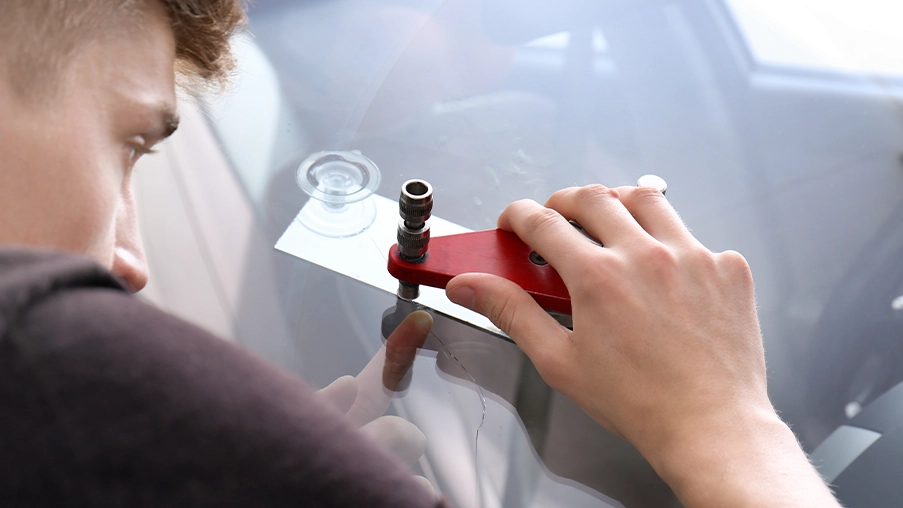Florida Auto Insurance Requirements: Coverage & Laws
February 17, 2025
Auto insurance is essential for Florida drivers, ensuring legal compliance and financial protection in case of accidents. The state uses a no-fault insurance approach; hence, regardless of who caused the accident, drivers must rely on their insurance for lost wages and medical expenses.
Meeting auto insurance requirements in Florida also affects vehicle repairs. Many insurance companies cover mobile auto glass repair for damage caused by accidents. This blog will cover Florida’s minimum auto insurance requirements, optional coverage, the legal ramifications of driving uninsured, and advice on choosing the appropriate policy.
Auto Insurance Requirements in Florida
Florida law mandates that all registered vehicles have minimum auto insurance coverage to operate legally. Under the no-fault insurance model, the state requires drivers to file claims with their insurance company after an accident, regardless of fault.
The minimum auto insurance in Florida includes:
- Personal Injury Protection (PIP): A minimum of $10,000 in coverage for medical expenses and lost wages, covering the policyholder and passengers.
- Property Damage Liability (PDL): A minimum of $10,000 to cover damages caused to another person’s vehicle or property.
Florida commercial auto insurance requirements may include higher business coverage limits, particularly for vehicles used for business operations. Taxis and ride-share vehicles must carry Bodily Injury Liability (BIL) coverage in addition to standard PIP and PDL.
Although no-fault insurance restricts lawsuits, victims may sue if injuries meet the serious injury threshold, such as permanent disability, disfigurement, or significant medical costs.
Ignoring Florida’s auto insurance regulations can result in fines of up to $500, license suspension, and loss of registration. Additionally, uninsured drivers must cover auto repair and replacement costs, including mobile auto glass repair and windshield replacement and repair after accidents.
Optional Auto Insurance Coverage in Florida
While minimum auto insurance in Florida satisfies legal requirements, it could not offer enough financial defense in every case. More coverage choices guard against uninsured drivers, car damage, and expensive medical bills.
- Bodily Injury Liability (BIL) covers medical bills, lost income, and legal fees for others if you are at fault in an accident. This coverage is strongly advised but not mandated like PIP.
- Uninsured/Underinsured Motorist (UM/UIM) Coverage protects you if a driver hits you without insurance or with inadequate coverage. This coverage is vital in Florida, where the percentage of uninsured drivers is high.
- Collision & Comprehensive Coverage: Collision insurance covers repair expenses for your vehicle following an accident, regardless of responsibility. Comprehensive insurance guards against events unrelated to collisions, including theft, vandalism, floods, or storm
Some policies also provide additional coverage, such as mobile auto glass repair and windshield replacement. On vehicles with Advanced Driver Assistance Systems (ADAS), the windshield replacement must be ADAS-calibrated to ensure the proper function of the system. Full coverage takes care of your car and finances beyond the state’s mandates.
Florida’s Unique Insurance Laws and Requirements
Florida’s unique auto insurance sets it apart from other states. Unlike most states, Florida does not mandate Bodily Injury Liability (BIL) coverage for personal policies. Instead, the state’s no-fault insurance requires Personal Injury Protection (PIP), which compensates lost wages and medical bills regardless of responsibility.
Florida also lets non-residents register and insure their vehicles locally if they accept employment or enroll their children in Florida schools. This ensures essential auto insurance compliance in Florida, even when you live there.
Another unique provision is Florida’s windshield replacement law, which waives deductibles for windshield repairs and replacements under comprehensive insurance policies. This rule makes windshield repair & replacement more reasonably priced for drivers. Certain insurance policies also cover mobile auto glass repair, enabling easy on-site servicing free from out-of-pocket expenses. Knowing these special rules helps drivers decide on appropriate coverage.
Penalties for Not Carrying Auto Insurance in Florida
Ignoring Florida’s auto insurance laws could result in heavy fines. In Florida, a motorist caught without minimum auto insurance may have their license and vehicle registration suspended until documentation of coverage is presented. Furthermore, depending on the number of breaches, reinstatement fees might range from $150 to $500.
Continuous coverage is required; even a policy gap could result in registration suspension. Therefore, insurance must be kept active even if the car is not used unless the license plate is turned in.
Since insurers view drivers without appropriate coverage as high-risk, future insurance prices could also be higher for such drivers. Those who want coverage restored have to prove insurance to the Florida Department of Highway Safety and Motor Vehicles (FLHSMV) and pay any required fines. Maintaining current coverage lessens these costly results.
How to Choose the Right Auto Insurance Policy in Florida
Selecting the right auto insurance policy in Florida requires careful consideration of budget, driving habits, and coverage needs. While minimum auto insurance in Florida meets legal requirements, additional coverage provides better protection.
Comparing multiple insurers helps find competitive rates and discounts. Many providers offer bundled policies or safe driver incentives, which can reduce costs without compromising protection.
Ensuring coverage for mobile auto glass repair and windshield replacement is essential, especially under Florida’s windshield replacement law. Policies that include comprehensive coverage often provide zero-deductible glass repairs.
Choose coverage that reduces out-of-pocket costs while also protecting against significant financial losses. Although higher deductibles can lower premiums, drivers should be sure they can afford potential repair expenses. A careful review of policy specifics ensures the optimum coverage for specific needs.
Conclusion
Understanding Florida auto insurance requirements ensures compliance and financial protection. Basic coverage handles liabilities, while comprehensive and collision offer added protection. Having insurance that includes mobile auto glass repair and replacement helps avoid unexpected costs from accidents or weather damage.
If your windshield is damaged, prompt auto repair and replacement are crucial for road safety. Nuvision Auto Glass provides mobile auto glass repair and replacement, making it more convenient for you. Call us today for fast and reliable auto glass services and help your vehicle remain safe on the road and protected under Florida’s insurance laws.
FAQs
1. What are the minimum auto insurance requirements in Florida?
Florida law requires $10,000 in Property Damage Liability (PDL) and Personal Injury Protection (PIP) for every registered car. These pay damages and medical bills independent of responsibility.
2. What is the new law for auto insurance in Florida?
The new rule has banned assignment of benefits (AOB) for vehicle glass claims, limiting third-party repair companies from directly charging insurance. To help lower false claims, more paperwork is now required for stricter PIP claim criteria. Drivers from Florida must stay updated to ensure adherence to state insurance regulations and avoid fines.
3. Can someone drive my car if they are not on my insurance in Florida?
Yes, but your insurance policy may act as primary coverage if an accident occurs. Any claim filed could affect your premiums.
4. Do I need 100/300 auto insurance in Florida?
While not necessary, 100/300 coverage provides better protection by covering $100,000 per person and $300,000 per accident for injuries. It’s beneficial for high-risk drivers or those with valuable assets.




